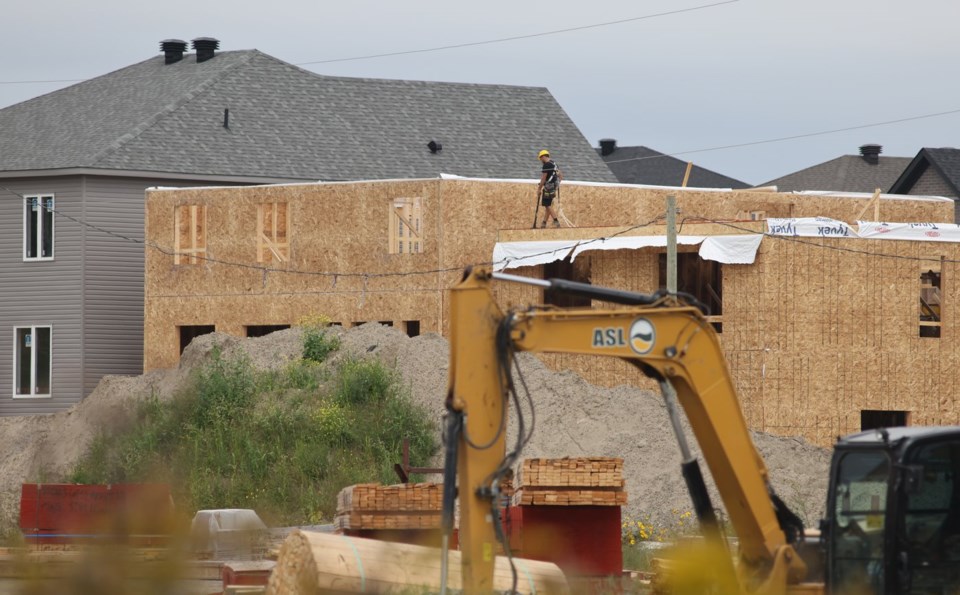The Canada Mortgage and Housing Corp. says construction of new homes in Canada's six largest cities rose four per cent year-over-year during the first half of 2024, but housing starts were still not enough to meet growing demand.
The agency said Thursday the growth in housing starts was driven by significant gains in Calgary, Edmonton and Montreal, while Toronto, Vancouver and Ottawa saw declines ranging from 10 to 20 per cent from the same period last year.
A total of 68,639 units began construction, the second strongest figure since 1990. However the rate of housing starts per capita meant activity was around the historical average and not enough "to reduce the existing supply gap and improve affordability for Canadians."
Housing starts in Canada's two largest markets, Toronto and Vancouver, were plagued by "traditional problems" such as high costs and regulatory delays, but also faced the additional hurdle of high interest rates in the first half of the year, CMHC deputy chief economist Aled ab Iorwerth said.
"Building some of these tall structures is very sensitive to interest rates, and that's put a bit of a drag on particularly the condominium apartments," he said in an interview.
"Individual buyers, individual investors are reluctant to put money down, and so that's led to a pause in the construction of condominium apartments."
The Bank of Canada starting cutting its key policy rate in June and has slashed it by a quarter percentage point three times to bring it to 4.25 per cent. The cost of fixed rate mortgages has also been trending lower in recent months.
Apartment starts in the six regions examined increased 2.5 per cent to reach 49,117, according to the report, driven by construction of new units for rent, as nearly half of the apartments started in the first half of 2024 were purpose-built rentals.
But condominium apartment starts fell in the first six months of the year in most cities, a trend which the agency predicts will continue amid soft demand as developers struggle to reach minimum pre-construction sales required.
In the Greater Toronto Area, a combination of high interest rates and an uptick in new condo completions has meant that sales activity isn't absorbing supply fast enough.
"We need a lot of purpose-built rentals in Toronto, but we also need a lot of those apartment structures for individual investors or for buyers to be built as well," ab Iorwerth said.
"My concern at the moment is that we haven't seen the end of it. There are a lot of lags in the housing system — it takes time to get approvals, it takes time to get financing — so I have to admit to being a little bit concerned that the situation in Toronto will not turn around quickly."
Meanwhile, housing has been a top issue in the B.C. election campaign amid high rents and property listings in that province.
The CMHC report said a decline of new construction in Vancouver was driven by slow sales and high financing costs that reduced profitability. Rental construction continued to make up a growing share of new apartment builds, supported by government policies and incentives.
But the report noted changes to provincial and municipal zoning policies aimed at increasing density could create more opportunities for future housing supply.
More purpose-built rentals under construction would help with affordability challenges down the road by increasing the vacancy rate and keeping rents in check, ab Iorwerth SAID.
"Toronto and Vancouver have become so expensive if you want a place to buy, that finding a place to rent is incredibly important for people," he said.
"If they want to get a job in Toronto and Vancouver, they will probably have to be in the rental system, so the fact that more and more of these units are being built is really important."
The economist added that with forecasts of borrowing costs continuing to fall into mid-2025, "there will be a new impetus for building more structures."
"The demand is there, but obviously the maths need to work," said ab Iorwerth.
"Developers are willing to build, but they need to keep their costs under control and lower interest rates will be one way of doing that."
This report by The Canadian Press was first published Sept. 26, 2024.
Sammy Hudes, The Canadian Press


